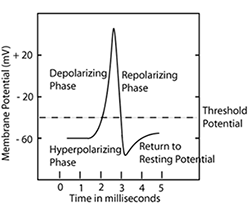Solving Sleep Related Disorders like Idiopathic Hypersomnia
Getting a good night’s sleep and still feeling tired? Or maybe you’re just having a really hard time getting out of bed even after a solid 10 hours of rest. According to new medical research, idiopathic hypersomnia is a growing sleep disorder in which a patient is excessively tired during the day, either with or without a long sleep time. Everything from obesity to cardiovascular disease to a weakened immune system have been attributed to poor sleep cycles. But what is at the core of this growing health concern?
Getting to the Core of Poor Sleep
Humans can only maintain long-term health if they live in accordance with the rhythm of nature. Any loss of this rhythm can result in fatigue, lack of vitality, increased susceptibility to infections, bodily diseases, psychosomatic illness, hormonal imbalance, and irregular sleep patterns.
 At the very core, poor sleep, grogginess, tiredness during the day, and fatigue are a rhythmic disturbance. Understanding molecular cell biology, we can see that every cell in our body requires both polarity and rhythm to function. Cellular depolarization and repolarization regulates the metabolism of the cell. This ongoing and non-stop cellular rhythm dictates the cells proper production of key processes. Without proper cellular rhythm, more common biorhythms of the body such as the solar / sympathetic daytime rhythms and lunar / parasympathetic nighttime rhythms as well as the proper production of hormones critical to sleeping and waking may be negatively impacted. Over time, being out of rhythm, at this base cellular level, may exhibit in symptoms and disease.
At the very core, poor sleep, grogginess, tiredness during the day, and fatigue are a rhythmic disturbance. Understanding molecular cell biology, we can see that every cell in our body requires both polarity and rhythm to function. Cellular depolarization and repolarization regulates the metabolism of the cell. This ongoing and non-stop cellular rhythm dictates the cells proper production of key processes. Without proper cellular rhythm, more common biorhythms of the body such as the solar / sympathetic daytime rhythms and lunar / parasympathetic nighttime rhythms as well as the proper production of hormones critical to sleeping and waking may be negatively impacted. Over time, being out of rhythm, at this base cellular level, may exhibit in symptoms and disease.
Oversleeping has been associated with thyroid disease, kidney and liver disease, depression and dementia.
The biochemistry that underlies rhythmic disturbances, as studied in the field of chronobiology, can be split into 3 biochemical hypotheses:
- Phase Shift Hypothesis – finding that bright light can suppress melatonin production
- Serotonin Hypothesis – a deficit in brain serotonin is the origin of depression
- Abnormal Pineal Melatonin Secretion Hypothesis – artificial lights used later in day reduce melatonin production
With a better grasp of the problem behind sleep disturbances like idiopathic hypersomnia (and the closely related insomnia), we can now effectively identify solutions to combat this growing dysfunction.
Lifestyle Solutions
There are specific habits we can begin to implement to reduce the impact of idiopathic hypersomnia and excessive tiredness. These include:
- Turn lights off at night to induce regular melatonin productions
- Experience the spectrum of natural light change first thing in the morning to reset cortisol receptors
natural sunlight is important to stimulate parts of our body like the adrenal glands (which stimulate adrenalin and sympathetic nervous system) - Turn off electronic devices that produce electromagnetic fields that influence hormonal production
- Amber, pink, red light (light therapy)
Allows N-acetyltransferaseto act as catalytic mechanism in melatonin biosynthesis
“Results suggest that the melatonin biosynthesis might play a significant role in Depression and autism spectrum disorders “
– Human Molecular Genetics, 10.1093/hmg/dds227
Although quite effective, for some this may not be enough to restore the circadian and bio-rhythms required to put an end to sleep disturbances and daily fatigue.
Integrative Medical Solutions
Many people who suffer from idiopathic hypersomnia rely on certain supplements to either help them sleep (e.g. melatonin) or stay awake (e.g. caffeine). This approach addresses the effect, or symptom, but does not correct the deeper underlying dysfunction such as irregular cellular rhythms. It is also important to realize that all the major glands in the body establish proper biorhythms and dictate sleep and active cycles. The hormones these glands produce include dopamine, melatonin, serotonin, and prolactin, and all are dependent on responses to stimuli. Therefore, providing the correct information and bioregulatory impulses, not supplementation, REGULATE and RESTORE these glands functioning to normal.
According to Dr. Thomas K. Szulc, MD (Medical Director, New York Center for Innovative Medicine), some of the specialized integrative and holistic solutions he regularly utilizes with great success in his medical center for patients with sleep related disorders include:
- Advanced European biological medicines
-
ACMOS Method
French energy balancing technique - Sound wave therapy
-
Biosyntonie treatment
protection from harmful EM pollution -
Oligotherapy
small doses of individual trace minerals for therapeutic support and enzymatic function
For practitioners treating sleep disorders like idiopathic hypersomnia, Dr. Szulc recommends focusing on the following for quick and effective treatment:
- Personalized, Individual Approach to each Patient – System like B.A.H. to personalize protocols
- Restore Functioning on a Cellular Level
- Address Toxicity, Mental and Emotional Disturbances
- Reestablish Proper Polarity and Rhythm
- Bring Patient Back to a Self-Managing Healthy State
The end goal of any integrative therapy for idiopathic hypersomnia or any sleep related disturbance should be restored rhythmic activity in the body (from a cellular level to organ / system level) and self-management.
Enjoy what you read?
[ninja-popup id= 20498][/ninja-popup]- you’ll always be in the (health) loop.
Or Check out other enlightening entries »
The post Solving Sleep Related Disorders like Idiopathic Hypersomnia appeared first on Innovative Medicine.
See how we can help you restore complete health of body, mind & spirit.
Lorem ipsum dolor sit amet, consectetur adipiscing elit, sed do eiusmod tempor incididunt ut labore et